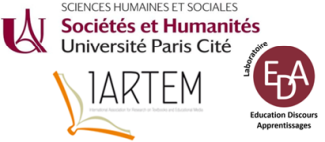Media and information education (EMI) is a cross-disciplinary component of the French education system. One of its aims is to help students to develop digital citizenship through critical thinking skills. EMI is not linked to any particular school subject, and is integrated into all of them. While the institution calls for collective coherence without providing the usual tools (curricula, textbooks, programms), the EMI is unevenly invested by teachers through a heterogeneity of practices. Based on ongoing research into the motivations of some middle and high school teachers involved in the EMI, the aim of this study is to determine whether the absence of textbooks and curricula leads teachers to take advantage of institutional online support resources (mainly in the form of teaching scenarios and practical tools sheets) (Aillerie et Rakotomalala Harisoa, 2020). The hypothesis is that, in a pedagogical environment built around an active approach, learning by doing takes precedence over understanding, and does not trigger the need to resort to educational resources. Therefore, teachers would prefer to use the autonomy allowed by the weak institutional framework to create their own resources, thus reinforcing their professionnal singularity and practising their pedagogical expertise.
In view of the individual dimension of this commitment, we opted for a comprehensive approach based on individual semi-directive interviews with 18 secondary school teachers from different school subjects. Analysis based on their accounts of their experiences and on their perceptions of the EMI enables us to identify the kind of documents used in the teaching situations described, in relation to the respondents' motivations.
According to the interviewees, the EMI is defined by its goals. Current institutional support resources are little-known and little-used. EMI is based on an active approach through publication or problem-solving situations. The activity sometimes takes a lead over the pedagogical objective and become self-sufficient. None of the respondents regretted the absence of reference supports or a specific program. They prefer to rely on « real » media publications (primary documents), with three objectives: to show that their field has a link with currents events ; that the course's knowledge content is useful for understanding the surrounding world ; and to get students to improve their critical thinking skills through real-life situations. Using medias' current matter also means that teaching materials (and teaching situations) are constantly renewed (Dounies, 2019).
To be involved in EMI is currently to be able to construct a teaching program without the support of a curricula or texbooks, i.e. to demonstrate professional expertise in creating a singular pedagogical framework. This expertise is also expressed in the ability to select and use non-academic or non-institutional documents for teaching (intellectual meaning of the job) (Barrère, 2017). For some teachers, the outside work time devoted to this research is an argument against involvement in EMI. Without identified reference documents, the knowledge associated with EMI is understood and teached in different ways, sometimes leading to counterproductive teaching discourses or situations.
Ressources :
Ministère de l'Education nationale (2022). Vademecum Education aux médias et à l'information. https://eduscol.education.fr/document/33370/download
UNESCO (2023). Citoyens éduqués aux médias et à l'information : penser de manière critique, cliquer à bon escient ! Paris : UNESCO. https://unesdoc.unesco.org
References :
AILLERIE, Carine & RAKOTOMALALA HARISOA, Ny (2020). Pratiques informationnelles des enseignants : le cas des ressources institutionnelles en ligne. Études de communication, 54, 137-156. https://doi.org/10.4000/edc.10252
BARRERE, Anne, (2017). Au cœur des malaises enseignants. Paris : Armand Colin, 208 p. (Individu et Société). ISBN : 978-2-200-61723-3
DOUNIES, Thomas (2019). Se montrer à la hauteur. Conformation professionnelle et intégration de l'actualité dans le faisceau de tâches des enseignants d'histoire-géographie. Carrefours de l'éducation, 48, 57-72. https://doi.org/10.3917/cdle.048.0057

 PDF version
PDF version
